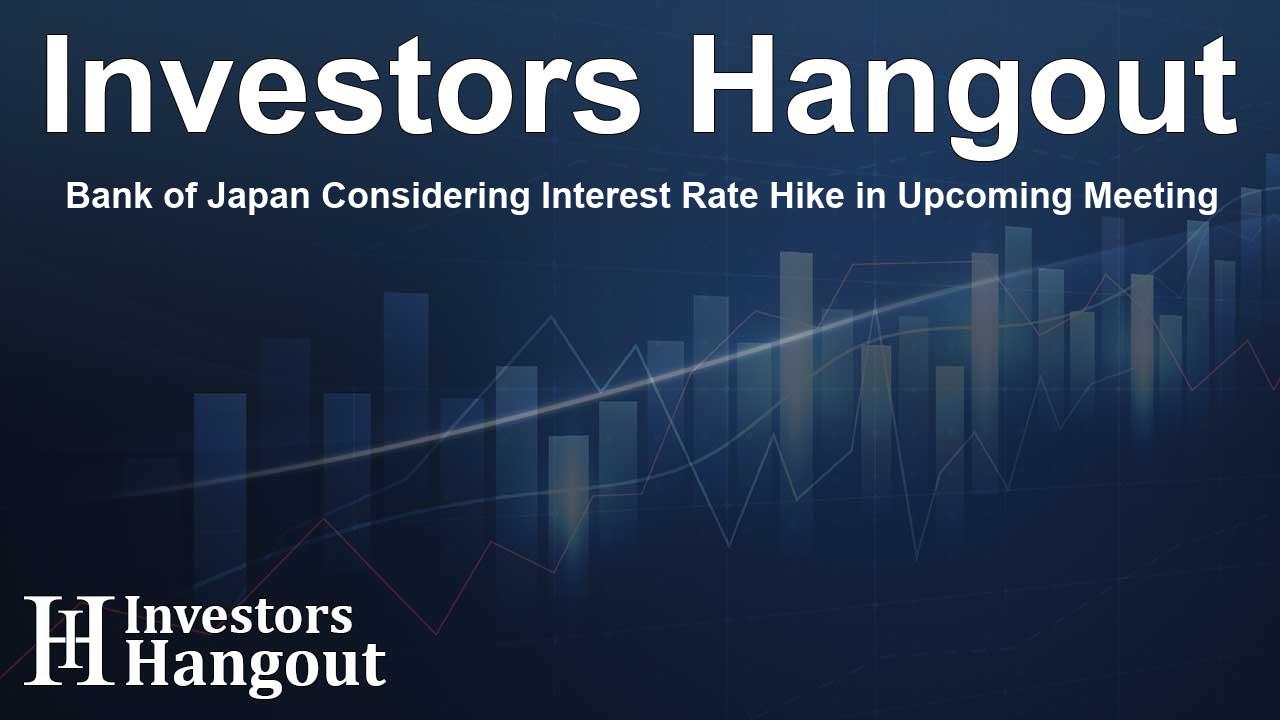Bank of Japan Considering Interest Rate Hike in Upcoming Meeting

Bank of Japan's Upcoming Interest Rate Discussion
The Bank of Japan (BOJ) is positioning itself to evaluate potential changes to interest rates in an upcoming discussion. Governor Kazuo Ueda highlighted during a recent meeting that this evaluation will heavily rely on the latest quarterly forecasts concerning growth and inflation.
Factors Influencing Rate Decisions
Governor Ueda emphasized that the central bank's rate decision is influenced by a multitude of factors. Among these, the economic policies introduced by the new U.S. administration play a significant role. The BOJ is closely monitoring how these policies may impact the Japanese economy and its monetary strategies.
Wage Negotiations Impact
Another critical aspect mentioned by Ueda is the ongoing negotiations between domestic firms and unions over wages. The outcomes of these wage discussions are essential as they could affect consumption patterns and inflation rates, thereby influencing the BOJ’s decision on whether to adjust interest rates.
Inflation Forecasts
The bank's fresh forecasts indicate concern over rising inflation. As inflation rates present new challenges, Ueda noted that the BOJ must remain vigilant in its efforts to maintain economic stability. This situation may prompt a shift in the bank's previously held low interest rate policy.
Central Bank's Role in Economic Recovery
The BOJ has been a pivotal player in Japan's economic recovery efforts, implementing various monetary easing strategies to stimulate growth. As the economy shows signs of recovery, the upcoming discussions will be vital in determining the future direction of the country's monetary policy.
Market Reactions
Market participants are actively anticipating the outcomes of this debate. Investors are keen on understanding how Ueda’s insights will translate into concrete policy actions. The financial markets are responsive to hints of changing rates, which can significantly influence trading behaviors.
Conclusion
As the Bank of Japan approaches this critical discussion next week, the stakes are high. With inflation pressures mounting and key economic indicators in the balance, Governor Ueda's leadership and the BOJ's decisions will be closely examined by economists and market analysts alike. It is clear that the path ahead will be determined by both domestic concerns as well as global economic trends.
Frequently Asked Questions
What is the Bank of Japan planning to discuss next week?
The BOJ will debate the possibility of raising interest rates based on new economic forecasts.
Who is the current governor of the Bank of Japan?
Kazuo Ueda is the current governor of the Bank of Japan.
What factors will influence the BOJ's decision on interest rates?
Factors include U.S. administration policies, domestic wage negotiations, and inflation forecasts.
Why are wage negotiations important to the BOJ?
Wage negotiations are important as they affect consumer spending and inflation, influencing rate decisions.
What does the BOJ's fresh economic forecasts indicate?
The forecasts indicate rising inflation, which may prompt reconsideration of the current low interest rate policy.
About The Author
Contact Addison Perry privately here. Or send an email with ATTN: Addison Perry as the subject to contact@investorshangout.com.
About Investors Hangout
Investors Hangout is a leading online stock forum for financial discussion and learning, offering a wide range of free tools and resources. It draws in traders of all levels, who exchange market knowledge, investigate trading tactics, and keep an eye on industry developments in real time. Featuring financial articles, stock message boards, quotes, charts, company profiles, and live news updates. Through cooperative learning and a wealth of informational resources, it helps users from novices creating their first portfolios to experts honing their techniques. Join Investors Hangout today: https://investorshangout.com/
The content of this article is based on factual, publicly available information and does not represent legal, financial, or investment advice. Investors Hangout does not offer financial advice, and the author is not a licensed financial advisor. Consult a qualified advisor before making any financial or investment decisions based on this article. This article should not be considered advice to purchase, sell, or hold any securities or other investments. If any of the material provided here is inaccurate, please contact us for corrections.
